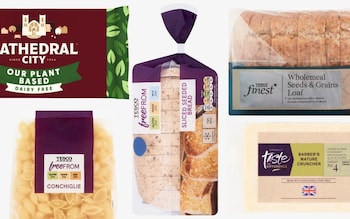In recent years intermittent fasting, or time-restricted eating as it is also known, has surged in popularity. According to the International Food Information Council, in 2022 around 10 per cent of Americans used intermittent fasting (IF) as a diet, and in the UK it is one of our most popular diet plans, with an average 134,000 monthly searches for it online.
The 16/8 approach, where you eat in an eight-hour window and fast for 16 hours has emerged as one of the most popular plans. This is partly because it’s relatively achievable – you can eat normally without complicated calorie counting, yet the fast is long enough to stimulate weight loss.
But how does the 16/8 fast really stack up? Will it help you lose weight and get healthier, or is it too restrictive to be sustainable? Read on to find out everything you need to know, as well as an exclusive meal plan to follow the diet for yourself.
Skip to:
- What is 16/8 intermittent fasting?
- How to do 16/8 intermittent fasting
- Benefits of 16/8 intermittent fasting
- Drawbacks of 16/8 intermittent fasting
- How does it stack up in the long term?
- Is 16/8 intermittent fasting right for me?
- How long does it take for 16/8 intermittent fasting to work?
- What to eat during intermittent fasting 16/8
- Fast 800’s 16/8 meal plan
What is 16/8 intermittent fasting?
The 16/8 intermittent fasting plan simply means choosing to eat your meals within an eight-hour window and fasting for 16 hours, which is mostly spent asleep. The window you choose to eat in depends on what works best for you:
- Some skip breakfast, eat their first meal around noon and finish eating by 8pm, which allows them to have dinner with their family and friends at a normal time
- Others might choose to finish dinner earlier, say by 6pm and start eating again with a late breakfast at 10am
Ultimately the choice is up to you, but experts recommend leaving at least three hours between finishing eating and going to bed.
Dr Federica Amati is a nutritionist and research scientist, who works for the health science company Zoe and teaches nutrition at Imperial College.
“Finishing your food by 8pm or 9pm is a good idea. Our body works on circadian rhythms and there are time clocks in each cell and each organ, so it is helpful for our body to have similar and consistent times for eating and sleeping. Of course, if you’re at a party or dinner, you should practise the 80/20 rule [where you enjoy whole foods 80 per cent of the time and indulge in treats 20 per cent of the time] and enjoy that social engagement,” she advises.
Dr Sarah Berry, an associate professor at King’s College London and the chief scientist at Zoe, says: “Our research has found that people eating later in the evening are more likely to wake up hungry the next day. This is because fullness signals are greater earlier in the day, so that bagel in the morning will initiate more fullness in the morning than if you had that bagel later in the day.
“Evidence is also emerging that eating late into the evening increases body weight and inflammation and negatively impacts sugar control,” she adds.
Eating late can also mean that the body is busy digesting food, which can impact falling asleep.
How to do 16/8 intermittent fasting
- A black tea or coffee in the morning is fine, don’t add milk or sugar as it will break the fast
- Don’t overcompensate for your fast by eating too much
- Stick to healthy eating
“Make sure that the meals you are having still have good dietary quality. You can’t fast for 16 hours then have five McDonald’s and expect to see good results,” says Dr Amati.
The nutritionist Emma Bardwell recommends eating carbohydrates earlier in the day, as the body processes them better. “Everyone just wants an easy trot, but the old adage of ‘eat breakfast like a king, lunch like a prince and dinner like a pauper’ is no less important if you’re following IF,” she says.
If you get hungry during the fast, try filling up on flavoured sparkling water. Bardwell advises her menopausal clients to start with a 12-hour fast and 12-hour eating window, as even that minor change can stop late-night snacking.
“It’s very individualised and there’s a lot of trial and error. If they start with a 12-hour fast and that feels fine I suggest nudging it up to a 14-hour fast and then a 16-hour fast. Your body likes routine so come up with a protocol that works for you and that you can stick to consistently,” she says.
Benefits of 16/8 intermittent fasting
- Weight loss
- Better blood sugar control
- Lower blood pressure
- More ‘good’ cholesterol and less ‘bad’ cholesterol
- Reduction in inflammation which can cause cancer, Type 2 diabetes and heart disease
- Eating more mindfully; less mindless snacking
- Reducing late-night bingeing
Research has shown that people who follow the 16/8 intermittent fasting regime, tend to lose weight because they unintentionally consume around 300 fewer calories daily. Most of the associated health benefits are a result of that weight loss. Indeed some scientists believe that IF itself is not a magic weight-loss bullet and that the main benefit is solely due to cutting back on calories rather than the time that you consume them.
Last year, Zoe conducted the “Big IF” study where they asked 140,000 people to reduce their eating window to what they considered a manageable 10 hours.
“A lot of studies use very rigid protocols like six-hour eating windows, and we wanted to look at something achievable in a real-life setting. I would be totally ‘hangry’ if I had to eat within six hours!” says Dr Berry.
“People found it quite easy to reduce their eating windows to 10 hours and we found that 71 per cent felt more energetic, 47 per cent were less hungry and 57 per cent had better moods. We also saw reductions in bad cholesterol, blood pressure, and inflammation. Weight loss was small, but the longer the fast and smaller the eating window the greater the weight loss,” she continues.
Although the positive health benefits are mostly a result of weight loss, it would follow that there would be even more benefits associated with the 16/8 plan, provided you can stick to it.
As well as weight loss, Dr Berry points out there does seem to be an additional benefit to time-restricted eating, although researchers are not clear yet what that mechanism is.
“We haven’t evolved to have food accessible to us 24 hours a day, so restricting our window allows our digestive system and gut microbiome time to rest, and also improves our sleep,” she says.
Drawbacks of 16/8 intermittent fasting
- Potential muscle loss in menopausal women
- Bloating or overeating
- Constipation
- Can impact female hormones and fertility
- Unsustainable over time, leading to regaining weight
- Might feel hungry and irritable
In March a study of over 20,000 American adults conducted by Shanghai Jiao Tong University in China found that people who eat within a window of eight hours a day or less may double their risk of death from heart disease, compared with those who maintain a more typical eating window of 12 to 16 hours. Yet many leading experts have questioned its findings.
Dr Claire Bailey is a GP who has popularised the 5/2 fasting regime and the Fast 800 diet alongside her husband, the broadcaster Dr Michael Mosley.
“The Shanghai study has not been peer-reviewed yet. It was a huge survey of Americans between 2003 and 2018 who were asked about their eating habits. Researchers picked out those that had ticked a box on two days a week that they had restricted their food, with no context as to why they had done that at all, which raises all sorts of huge questions, like are they doing shift work which we know is linked to cardiovascular disease. Without any context it is pretty much meaningless,” she says.
However, she does point out that the 16/8 regime may not be the best approach if your goal is to lose quite a bit of weight.
“You will get some weight loss benefit from it, but we have found that the Fast 800 approach where you reduce your calories on some days to 800-1,000 calories and eat a healthy Mediterranean style low-carb diet, is the most effective for weight loss. That approach combines well with doing a 12/12 time-restricted fast which is the one I follow, or a 14/10 on your non-fast days.”
The effect of fasting on the gut
Others like Dr Gabrielle Morse, a dietitian at the Gut Health Clinic, caution that the 16/8 could lead to constipation and bloating.
“The communication between the stomach and the colon is strongest in the morning, and so you’re most likely to get a bowel movement in the morning after eating. In my experience, people doing the 16/8 tend to get constipated as they don’t have the oats, seeds and high-fibre foods for breakfast in the morning that bring on that bowel movement. They can also over-eat when they break their fast, leading to bloating,” she says.
How effective it is for women
Many experts don’t believe that the 16/8 approach is as effective for women.
“If your body doesn’t have a source of glucose, it will start breaking down fat and muscle. We do not want to put menopausal women at risk of muscle breakdown as they already have a higher risk of osteoporosis,” says Dr Morse.
Dr Amati says female hormones may not respond well to fasting.
“Women’s hormones are different to those of men, and constantly fluctuating,” she adds. “We need a very consistent intake of food, it goes back to evolution – our reproductive system is happiest when it feels like there is a steady source of energy, as that means it’s safe to have a baby. Post-menopause, we become less metabolically flexible, and then food consistency is also important,” she says.
How does it stack up in the long term?
Experts also worry that the 16/8 approach may not be sustainable over the long term. Most studies show that people regain any lost weight within one to two years, so any meaningful plan must be something we can stick to long-term.
Bardwell recommends smaller dietary changes to the menopausal women she works with. “It might be as simple as keeping your wine drinking to the weekends, or taking out a couple of oat lattes. It should be manageable and something you can stick to,” she says.
Is 16/8 intermittent fasting right for me?
The 16/8 fasting plan isn’t suitable for:
- Those who are pregnant, breastfeeding or trying to conceive
- People with Type 1 diabetes
- Anyone with an eating disorder, health anxiety or a poor body image
- People with a low body weight or who are frail
- Female athletes who are menstruating
- People with mental health disorders
- People with other health conditions should check with their doctor
“Some people find 16/8 fits in really well with their lifestyle and if you have Type 2 diabetes and are overweight it could be a useful tool on learning how to reduce your food intake overall or develop a new relationship with food,” says Dr Amati.
How long does it take for 16/8 intermittent fasting to work?
Professor Mark Mattson, a neuroscientist at Johns Hopkins University, has studied intermittent fasting for years and estimates that it can take two to four weeks for the body to become accustomed to intermittent fasting.
In the big IF study by Zoe, participants lost around 2 pounds per week, and according to a review of studies by Sydney Medical School, people lost an average of 7-11 pounds over 10 weeks.
What to eat during intermittent fasting 16/8
Experts recommend sticking to a healthy Mediterranean-style diet which includes:
- Plenty of lean protein to feel full and maintain muscle mass
- Nuts, seeds, and a variety of fruit and veg
- Olive oil and oily fish
- Wholegrains
- Minimise starchy carbs
- Avoid ultra-processed foods
Fast 800’s 16/8 meal plan
This exclusive meal plan for the 16/8 is created by Dr Clare Bailey from the Fast 800.
See ingredients and nutrition information below
Day 1
Breakfast: Green brekkie bowl

Calories: 343
- ½ tbsp extra virgin olive oil
- 2 large free range eggs
- 70g kale, shredded
- ½ courgette, chopped
- 50g button mushrooms, sliced
- 50g spinach leaves
- ½ avocado, sliced
- Salt and pepper
Lunch: Pear and hazelnut salad

Calories: 670
- ½ pear, sliced
- ½ cucumber, sliced
- 30g hazelnuts
- 60g feta cheese, crumbled
- 50g rocket
- ½ tbsp balsamic vinegar
- ½ tbsp extra virgin olive oil
- ½ 400g tin canned lentils, drained and rinsed
Dinner: Slow-cooked Mediterranean lamb

Calories: 506
- 1 tsp extra virgin olive oil
- 200g boneless lamb shoulder, excess fat trimmed
- ¼ red onion, finely chopped
- 1 celery stalk, finely chopped
- 1 garlic clove
- ¼ lemon, rind finely grated
- ¼ x 400g tin chopped tomatoes
- 120 ml vegetable stock
- 1 bay leaf
- ¼ x 400g tin chickpeas, rinsed, drained
- 10g green pitted olives
- Salt and pepper
- Greens to serve
Total calories: 1,519
89.3g protein; 60.7g carbohydrates; 97g fat/;34.7g fibre
Day 2
Breakfast: Portobello toast with salmon and eggs

Calories: 474
- 2 portobello mushrooms
- 1 tbsp extra virgin olive oil
- 50g smoked salmon
- 20g soured cream
- 2 large free range eggs
- 30 g rocket
- ¼ lemon, juice
- Salt and pepper
Lunch: Broccoli soup with bread

Calories: 480
- ½ broccoli, roughly chopped
- ½ leek, roughly chopped
- ¼ courgette, roughly chopped
- 250ml vegetable stock
- 40ml single cream
- 40g cheddar cheese, grated
- Salt and pepper
- Serve with 1 slice wholemeal or rye bread
Dinner: Parsley and Parmesan chicken with roast veg

Calories: 583
- 1 tbsp extra virgin olive oil
- 150g skinless chicken thigh, (boneless)
- 15g ground almonds
- 20g parmesan cheese, grated
- 1 tbsp fresh parsley, chopped finely
- ¼ lemon, zest and juice
- Serve with
- 150g butternut squash, chopped
- 100g Brussels sprouts, halved
- ¼ red onion, in wedges
- Salt and pepper
Total calories: 1,537
103.4g protein; 46.2 carbohydrates; 99g fat; 26.8g fibre
Day 3
Breakfast: Simplest pancakes

Calories: 310
- 2 large free range eggs
- 1 banana, mashed
- 2 tsp extra virgin olive oil
Lunch: Cauliflower cheese pasta bake

Calories: 644
- 70g dry wholemeal or pulse pasta
- 1 tsp extra virgin olive oil
- ½ leek, finely sliced
- fresh sage, chopped
- ½ tsp ground nutmeg
- 100g cauliflower, roughly chopped
- 100g butternut squash, roughly cut into 1cm cubes
- 50g full fat cream cheese, roughly chopped
- 10g ground almonds
- 10g Parmesan cheese, grated
- Salt and pepper
Dinner: Steak with Caprese salad

Calories: 524
- 200g beef sirloin steak
- ½ tbsp extra virgin olive oil
- 1 tomato, sliced
- fresh basil, torn
- 60g fresh mozzarella, sliced
- Salt and pepper
Total calories: 1478
100.1g protein; 74.7g carbohydrates; 82g fat; 24.8g fibre
Disclaimer: The copyright of this article belongs to the original author. Reposting this article is solely for the purpose of information dissemination and does not constitute any investment advice. If there is any infringement, please contact us immediately. We will make corrections or deletions as necessary. Thank you.


